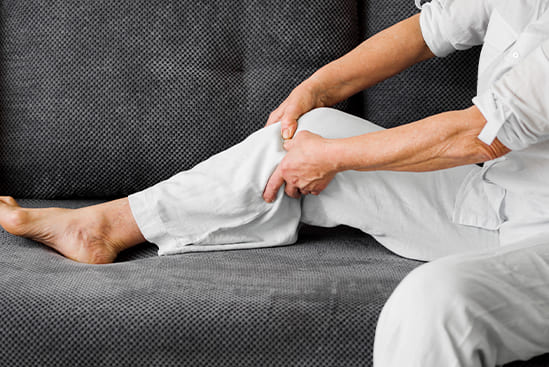
Synapse Physiotherapy
The Science Behind Shockwave Therapy for Healing
What Is Shockwave Therapy?
Shockwave therapy, also known as extracorporeal shockwave therapy (ESWT), is a non-invasive treatment that stimulates the body’s natural healing mechanisms. It helps relieve pain and promotes the healing of injured tendons, ligaments, and other soft tissues by releasing growth factors in the damaged areas.
Originally developed for breaking down kidney stones (lithotripsy), shockwave therapy has been adapted for orthopedic and rehabilitation purposes. It is considered a form of regenerative medicine due to its ability to enhance tissue repair. In addition to treating tendinopathy, it is particularly effective for stubborn ligament injuries. Some degenerative tendinopathies may involve a buildup of calcium deposits in the tendon, which focused shock waves can help break down, aiding in mobility and pain relief.
There are two main types of shockwave therapy:
- Focused Shockwave Therapy (FSWT) – Uses concentrated waves to target deep tissues.
- Radial Shockwave Therapy (RSWT) – Uses dispersed waves to treat surface-level injuries.
How Shockwave Therapy Works
Shockwave therapy works through several physiological mechanisms that enhance tissue repair and regeneration. These include:
1. Increased Blood Flow
The acoustic waves stimulate the formation of new blood vessels (angiogenesis), improving blood circulation in the affected area. Increased blood flow helps deliver oxygen and nutrients necessary for tissue repair.
2. Breakdown of Calcifications
Shockwave therapy helps dissolve calcium deposits in tendons and soft tissues, reducing stiffness and pain. This is particularly effective for conditions like calcific tendinitis.
3. Stimulation of Collagen Production
Collagen is a key protein in tendons and ligaments. Shockwave therapy promotes collagen synthesis, strengthening connective tissues and enhancing their ability to withstand stress.
4. Pain Reduction
Shockwaves disrupt pain signals by overstimulating nerve endings, leading to decreased sensitivity. Additionally, they stimulate the release of endorphins, which act as natural painkillers.
5. Acceleration of Cellular Repair
The mechanical force from shockwaves triggers cellular regeneration, stimulating the production of growth factors and stem cells that aid tissue repair.
Scientific Evidence Supporting Shockwave Therapy
Numerous studies have validated the efficacy of shockwave therapy for various conditions. Some key findings include:
- A 2015 systematic review published in the American Journal of Sports Medicine found that shockwave therapy significantly improved pain, function, and overall quality of life in patients with plantar fasciitis and Achilles tendinopathy, making it a viable alternative to conventional treatments.
- Research in the Journal of Orthopaedic Surgery and Research (2019) indicated that shockwave therapy is as effective as surgery for treating tennis elbow, reducing pain and improving mobility.
- A 2021 study in the British Journal of Sports Medicine found that shockwave therapy significantly improved pain relief and tendon function in patients with patellar tendinopathy (jumper’s knee), supporting its use as a first-line treatment for chronic cases.
Conditions Treated with Shockwave Therapy
Shockwave therapy is widely used for treating:
- Plantar Fasciitis – Heel pain caused by inflammation of the plantar fascia.
- Tennis Elbow (Lateral Epicondylitis) – Overuse injury affecting the tendons of the elbow.
- Achilles Tendinitis – Inflammation of the Achilles tendon, common among runners.
- Calcific Tendinitis – Calcium deposits in tendons, especially in the shoulder.
- Patellar Tendinopathy (Jumper’s Knee) – Overuse injury affecting the knee tendons.
- Frozen Shoulder – Stiffness and pain in the shoulder joint.
- Hip Pain – Conditions like trochanteric bursitis.
- Shin Splints – Pain along the shin bone due to repetitive stress.
- Stress Fractures – Microfractures that can benefit from enhanced bone healing.
FAQs About Shockwave Therapy
Is Shockwave Therapy Painful?
Most patients experience mild discomfort during shockwave therapy, but it is generally well-tolerated. The level of discomfort varies based on individual pain thresholds, the severity of the condition, and the proximity of the treatment area to a bone. Treatments near bones tend to be slightly more uncomfortable. To minimize discomfort, a topical gel is applied before the procedure, and the discomfort usually subsides immediately after treatment.
How Long Does a Shockwave Therapy Session Take?
A typical shockwave therapy session lasts between 10 to 15 minutes. Depending on the severity of the condition, patients usually undergo seven treatments over a period of several weeks for optimal results.
How Effective Is Shockwave Therapy?
Clinical studies and sports medicine specialists have observed significant healing in patients undergoing shockwave therapy. While results may not be immediate, pain relief and tissue repair continue to improve over time as the body’s natural healing processes are activated. Ongoing research is helping to further validate its long-term effectiveness.
Additionally, shockwave therapy is often combined with other treatments, such as:
- Physical therapy – To strengthen the affected area and improve movement patterns.
- Injury prevention programs – For athletes, specialists may analyze movement patterns to reduce the risk of re-injury.
How Long Is the Recovery Period from Shockwave Therapy?
One of the key benefits of shockwave therapy is its minimal downtime. Most patients can resume normal activities within 24 hours after treatment, making it an attractive option for athletes and active individuals looking for a quick recovery.
Advantages of Shockwave Therapy
1. Non-Invasive and Safe
Unlike surgery, shockwave therapy does not require incisions or anesthesia, making it a safer alternative with fewer complications.
2. Quick and Convenient
Each session typically lasts 15-30 minutes, with most patients requiring 3-6 sessions for optimal results.
3. Minimal Downtime
Patients can resume normal activities shortly after treatment, making it ideal for athletes and active individuals.
4. High Success Rate
Studies suggest 70-90% of patients experience significant pain relief and functional improvement.
Potential Side Effects and Limitations
Although shockwave therapy is generally safe, some individuals may experience:
- Mild swelling or redness
- Temporary discomfort during or after treatment
- Bruising in the treated area
Additionally, shockwave therapy may not be suitable for individuals with bleeding disorders, active infections, or pregnant women.
Conclusion
The science behind shockwave therapy is compelling, with strong evidence supporting its effectiveness in stimulating healing, reducing pain, and improving mobility. As a non-invasive and efficient treatment option, it is revolutionizing the way musculoskeletal conditions are managed. If you’re struggling with chronic pain or slow-healing injuries, consulting a healthcare professional about shockwave therapy could be a game-changer for your recovery.
For those seeking expert care, Synapse Physiotherapy provides specialized shockwave therapy treatments tailored to individual needs. Their team of professionals integrates cutting-edge technology with personalized rehabilitation plans to ensure optimal recovery and long-term pain relief. Whether you are an athlete looking to return to peak performance or someone dealing with chronic musculoskeletal pain, Synapse Physiotherapy can help guide you toward a pain-free life.
Tags :

Back & Neck Pain
Conditions such as stiffness, postural abnormalities and muscle overuse from prolonged desk work at the office or home is more prevalent than most would think. We provide the necessary tools to fix you up and educate you on ergonomics which can unload unnecessary stress.
- Spine & Core Rehabilitation
- Strength & Conditioning Programme
- Pain Management
- Biomechanical Assessment
- Sports Physiotherapy
- Group Class

Sports Injuries
Rolled ankles, jarred knees, impinged shoulders are few conditions in the plethora of sports injuries which can hamper performance and limit our enjoyment of sports. Physiotherapy not only treats the symptoms of these conditions but propels your overall fitness to greater heights.
- Strength & Conditioning Programme
- Pain Management
- Biomechanical Assessment
- Sports Physiotherapy
- Shockwave Therapy
- Group Class

Work Desk Injuries
Conditions such as stiffness, postural abnormalities and muscle overuse from prolonged desk work at the office or home is more prevalent than most would think. We provide the necessary tools to fix you up and educate you on ergonomics which can unload unnecessary stress.

Pre-Post-Surgical Conditions
Surgery involves going through preparation both before and after. Physiotherapists play a vital role in getting your body ready for surgeries with circulatory, breathing and strengthening exercises. After the procedure, let us be there for your recovery and rehabilitation, taking it one step at a time.

Scoliosis & Postural Abnormalities
The way we stand, sit, walk and sleep has influence over our posture and the overall balance of muscles controlling its alignment. A comprehensive screening can be done by our physiotherapists to detect abnormalities, which we will aid in correcting.

Neurological Conditions
Neurological disabilities such as stroke, nerve compression and neuropathies can be barriers for patients to live life to its fullest. We at Synapse are committed to help you overcome these hurdles by ensuring functional mobility and quality of life is at its optimum by providing the right treatment and exercises.

Osteoarthritis & Rheumatism
Joint degeneration and inflammation happens as the human body grows older, but that does not mean our way of life degenerates as well. Relief your joint pains with a joint effort together with your physiotherapist, who will provide pain-relief treatments and prescribe exercises for your wellbeing.

Conditions Relating To Elderly
Common conditions in the older age population include hips & knee pain, back & neck pain, osteoarthritis, rheumatism, fear of falling and many more. Aging and degeneration of bodily function is inevitable, but here at Synapse, we will help you live the best of your life.

Home Physiotherapy
We understand that some conditions or injuries can make it difficult to receive rehabilitation at our clinic be it mobility or transportation issues. Our objective is to provide you with the same high-quality physiotherapy services at home that you would receive in-clinic.
